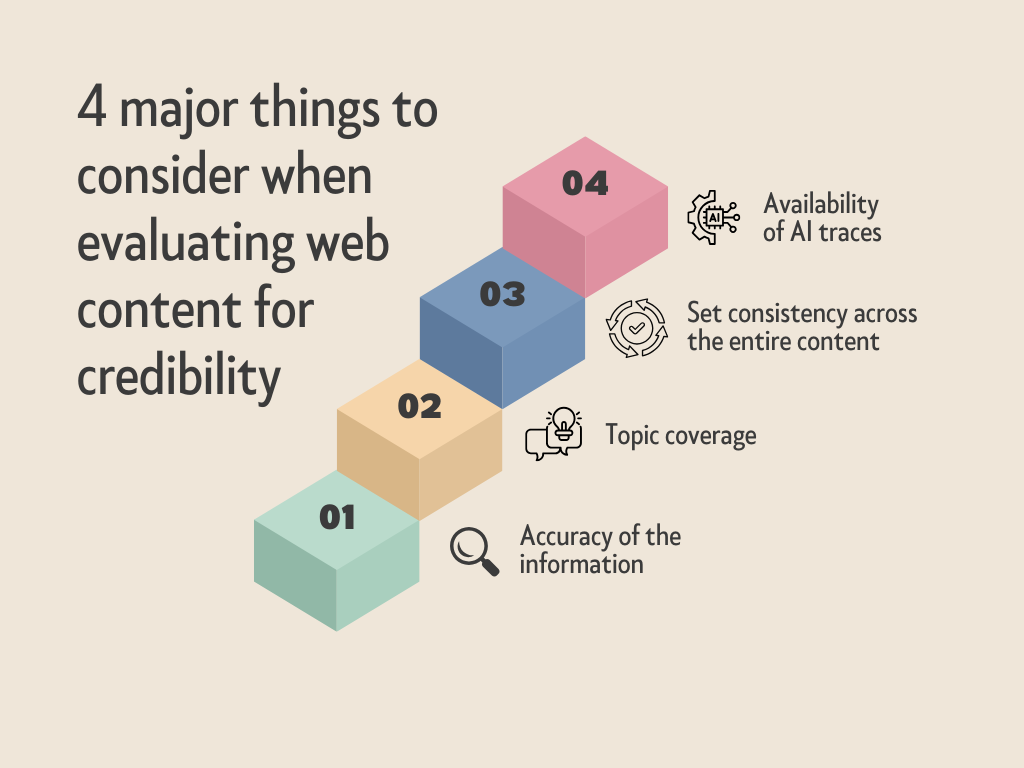
4 Things to Look for When Evaluating Your Web Content for Credibility
The difference between a trustworthy website and a forgettable one often comes down to its content credibility.
Both users and search engine algorithms make split-second judgments to decide whether the content they are reading is actually credible and authoritative or not. And this can influence overall bounce rate, user engagement, and SERP rankings as well.
Now, most of you will be thinking: How to know if your web content is credible? Don’t worry! In this blog post, we will be explaining some of the major things you need to consider in this regard.
4 major things to consider when evaluating web content for credibility

Here are four critical elements that you need to consider when evaluating content for credibility and authoritativeness.
1. Accuracy of the information
This is obvious – content credibility always begins with factual correctness. Inaccurate information not only leads to poor rankings and low engagement but also contributes to damaging your website’s reputation in the targeted niche.
So, when evaluating content for credibility, always validate the correctness of the given information by considering the following things:
Verify sources: Confirm the legitimacy of the given information by verifying it from authoritative sources, i.e., government databases, established news outlets, research journals, etc.
Cross-check stats: Double-check all the statistics or claims to make sure they are relevant, accurate, and up to date. Refer to platforms like Statista for assistance.
Look for misinterpretation: Even if the source is accurate, ensure the given interpretation is perfectly tailored to the primary context.
It is important to note that a small mistake in the information can make the audience doubt the entire page.
2. Topic coverage
Credible content is one that covers every bit of detail about the topic, leaving no room for confusion. So, this is yet another factor that you should consider during the evaluation process.
Here are a few questions whose answers you need to look for in the web content.
Does it answer all the likely questions?
Check if the web content effectively anticipates reader intent and offers complete answers, so that they don’t have to search anywhere else.
Are there any examples or scenarios included in it?
See if the content contains relevant examples, case studies, or anything that helps the readers better understand the given information.
Does it link to any internal or external sources?
Remember, credible content always acknowledges that no piece can say it all. That’s why, review whether it links to relevant and authoritative sources to support the given claims.
Keep in mind that the content shouldn’t sound like a shallow overview; instead, it should reflect a thought of leadership by providing value thoroughly.
3. Consistency across the entire content
Consistency in the write-up not only indicates the skillset of the writer but also helps build familiarity with the readers, which ultimately results in trust. You might be wondering: What exactly is consistent content?
It covers three elements that we have briefly listed below.
Messaging: The content should be free from any kind of contradictions, preventing the chances of confusion.
Tone & voice: It should follow a relevant yet consistent tone (e.g., formal, professional, conversational, etc.) throughout the content.
Structure: The overall structuring in terms of formatting should also be the same from start to end. The heading styles, fonts, paragraph spacing, etc., should be similar.
When evaluating the web content credibility, you should closely pay attention to the aforementioned consistency elements. If they are fine, then you are good to go; otherwise, you have to make improvements.
4. Availability of AI traces
The use of AI-generated content is increasing day by day. However, the issue is that both the audience and search engines (like Google) usually discourage AI content as it lacks originality, creativity, and a human touch.
So, while evaluating the text for credibility, it is essential to determine whether it is generated by an AI tool or actually written by a real human. To do so, avoid relying on manual guesswork, as it increases the chances of misinterpretations.
A better approach is to scan the web content through an AI detector. It will immediately tell if it is AI-generated or human-written, along with a percentage for easy evaluation.
So, these are a few essential things that you need to consider when evaluating web content for authority and credibility.
Wrapping up
As a webmaster, you must maintain credibility across the entire web content. This is essential, as it directly impacts the SERP ranking and overall user engagement. There are several factors that you need to consider when gauging content for credibility.
The major ones include: Verifying accuracy, determining topic coverage, ensuring consistency, and identifying potential traces of AI content. All of these are properly explained in this blog post.
You read a lot. We like that
Want to take your online business to the next level? Get the tips and insights that matter.

